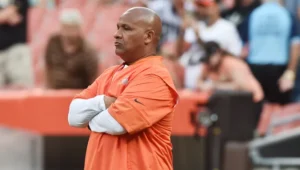The Cleveland Browns were dealt a difficult final stretch of the season. Will it doom their chances or can they overcome the disadvantage?
However, dedicating weeks of coverage and insider conjecture to a “event” that is essentially just an ordering of known facts feels like the pinnacle of NFL excess. The opponents for the following season are determined by the NFL’s scheduling formula, which takes effect as soon as the current regular season ends.
Now it’s just a matter of scheduling the games and threading a thousand little needles that most spectators will never have to think about. Due of a concert that takes place in Browns Stadium earlier in the week, the Browns will be traveling during Week Two. Every week, comparable circumstances arise throughout the league. None of those clashes in schedule lend itself to conjecture or amusing television. The notion of an easy or hard schedule is the only thing that can pique people’s interest in speculating. Travel and rest imbalances alone can make a “easy” schedule appear a lot harder, depending on the opponents and the times each team plays their night games. The reason the schedule release has grown into a week-long coverage is because of delving into these details.
Regarding the 2024 Browns, one important thing to remember is this. From Week One through Week Six, the Browns have one of the easier schedules in the NFL. They have one of the hardest weeks from Week Eleven to Week Eighteen. The team’s final stretch of games consists of four division games (including the three divisional road trips), two Thursday night games (both divisional matches), a Monday night road trip to Denver that shortens the week for a road trip to Pittsburgh, and just three of the eight games played at home, one of which is against the Kansas City Chiefs, the defending Super Bowl champions.
Though there are reasons to be hopeful that a strong start would build momentum and provide the Browns the courage to face a challenging schedule in the second half, it’s also plausible that injuries, along with the travel and little rest they’ve received, may prove to be too much for them. Indeed, the Browns managed to persevere and prosper in the last stretch of the previous season, but their schedule was advantageous save from a disastrous two-week trip to the West Coast.
It is depressing that the Browns, with one of the league’s most talented rosters, could be undone by the whims of a supercomputer that determined it was acceptable for them to play four weeks in a row from Week 11 to Week 14 on the road or with no rest. The AFC North and the Browns’ chances of making the playoffs could be decided by whether or not they travel extensively over the next three weeks without getting enough sleep, which leaves them with a skeleton team when they play Pittsburgh on December 8. From this vantage point, it appears certain that the Browns’ ridiculously late schedule will finally catch up to them in mid-May.
It’s not only about the Browns, by the way. The following eight games for the Steelers themselves are considerably more challenging; they include an NFL first—a Wednesday Christmas game. The 49ers were likewise dealt a raw deal, starting an incredible eight of their seventeen games with a rest disadvantage. Four times, San Francisco will play opponents that have just returned from a bye.
All this, in a roundabout way, leads me to my point. The NFL is compelled to push the schedule to the breaking point for numerous clubs because they are so fixated on boosting money at every opportunity.Professional football is the world’s most grueling team sport in a number of ways. When elite athletes are required to play 17 games, many of them after crossing continents or with less than a week’s recuperation, it has a serious negative impact on both the standard of competition and their health.
To guarantee greater parity across the teams, the league must step back and restructure its scheduling practices (and most likely the underlying schedule rotation). Stricter regulations regarding timetable discrepancies are required. It’s better if it implies that fewer games on Thursdays (and Wednesdays) are also required.The NFL should acknowledge that playing football after four days off is detrimental to both the game and its players. Fans do not require Thursday Night Football.
An eighteenth game is quickly approaching, so you’ll go broke betting against the NFL pushing the boundaries, but you only have to go back one season to see what can happen to the prime-time properties the NFL will stop at nothing to support. In his Monday night Jets debut, Aaron Rodgers tore his Achilles tendon, and for the remainder of the season, Zach Wilson and New York dominated prime-time television. In a similar vein, Joe Burrow, Justin Herbert, Kirk Cousins, Deshaun Watson, and Anthony Richardson all concluded the season on injured reserve. Injuries also kept CJ Stroud, Justin Fields, Matthew Stafford, Geno Smith, and Kyler Murray from playing in 2023.
We’re talking about one job here. There isn’t enough column space to list every injury suffered by well-known players this season. There’s no reason, in my opinion, that 2024 won’t have a similar number of injuries, which will inevitably lead to fewer games that live up to the excitement that has been surrounding them for the previous week.
One may argue that the NFL has discovered the ideal racket. When the anticipated star-studded matchup finally happens, we’re all so hyped up from the build-up that it barely matters that four of the eight biggest stars in the game are hurt and can’t play. Their media arm spends the winter building up titanic confrontations between star-studded squads. The NFL is planning release week celebrations to sell you on the sizzle rather of the meat.


